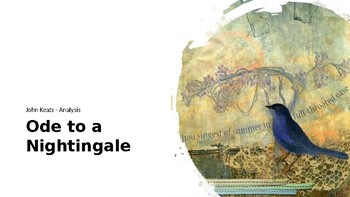

The song of the nightingale moves from the poet to the depth of his heart and creates in him a heartache and numbness as is created by the drinking of hemlock. Thus the poem is an expression of Keats's feelings rising in his heart at the hearing of the melodious song of the bird. Brown rescued the papers and found them to be the poem on the nightingale. Keats wasn’t sure if he was still alive or had died.After he had finished the poem he came back with scraps of paper in his hand. The song of theNightingale had faded and Keats composed, thy plaintive anthem fadesand now tis buried deep (75 & 77) and he didn’t know if it was real or if hehad dreamed the whole thing. the fancy cannot cheat so well As she is fam’d to do (73-74) Here he had stated that the rich could not buy their way out of deathbecause that was all the Nightingale had come to do. Overgenerations, the bird has warned “emperors and clowns” that death can not becheated.

Thouwas not born for death, immortal Bird! (61) The immortal Nightingale wasn’tput on this earth to bring people to their deaths, according to Keats. (59-60) Here he was saying how the “Darkling” sounded beautiful when itsang but that was just a mask for the fate that it was taking him to death. He then illustrated all thecreatures and things that would live long past him The grass, the thicket, andthe fruit-tree wild (45) In paragraph six, Keats had listened to the “Darkling” or Nightingalesinging and this had reminded him of how at one time in his life he questioneddeath and was even infatuated by it because death was an unknown universewhen he composed: for many a time I have been half in love with easefulDeath, Call’d him soft names (51-53) But quickly after he had recalled thatmemory he stated: Still wouldst thou sing, and I have ears in vain- To thy highrequiem become a sod. Keats went on to say: Icannot see what flowers are at my feet, Nor what soft incense hangs upon theboughs, But, in embalmed darkness (41-43) This meant he didn’t know whatwas about to happen, only that he was going to die. In paragraph four, Keats had spoken to the Nightingale and told it togo off and leave him alone because he already had known that death wascoming and didn’t want to be reminded of his sad fate. He expresses that with the phrase:And with thee fade away into the forest dim (20) Keats explained that he hadwanted to wander off into the forest so no one would’ve had to be bothered byhim. Keats was afraid of death becauseof the loved one’s he had to leave behind. According to him, being rich, popular, beautiful, funny and smart didn’tmatter because the angel of death was blind.
Ode to nightingale analysis full#
In verse three, Keats expressed that most people enjoy a full life and dieold, when he pens: Here, men sit and hear each other groan last gray hairs,Where youth grows pale, and spectre-thin, and dies (24-26) He felt that youthwas a time in one’s life to enjoy.

Keats vividly and beautifully describedwine: for a beaker full of the warm South With beaded bubbles winking atthe brim, And purple stained mouth That I might drink, and leave the he usedto bury his fears and emotions about death. “Shadows numberless” at the end of the paragraph signifies the angel of deathand spirits that had surrounded Keats.


 0 kommentar(er)
0 kommentar(er)
